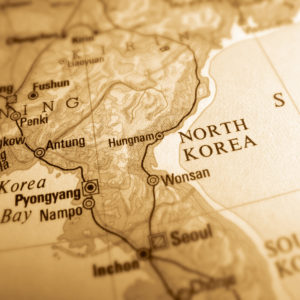SEOUL — U.S. and South Korean officials are at odds on the meaning of “denuclearization” when it comes to assessing North Korea’s genuine willingness to talk about getting rid of its nuclear program.
The Americans want serious denuclearization, an end to North Korea’s nuclear program, while South Korean officials look for understanding of North Korea’s position and possible accommodation with the North. At a recent seminar in Seoul, the stark contrast between the U.S. and South Korean approach emerged clearly.
Some participants argued that North Korea would never get rid of its nukes and missiles until the Americans had not only called off war games beginning next year but also begin to withdraw their 28,500 troops from Korea on the way to shutting down their bases and negotiating a “peace treaty” marking a formal end to the Korean War.
South Korean officials are not supporting the North Korean view exactly but trying to create conditions under which President Donald Trump can at least hold a constructive conversation with North Korea’s leader Kim Jong-un in hopes of easing tensions and eventually coming to terms.
It’s for that reason that South Korea’s President Moon Jae-in has suggested that perhaps he and Trump could meet Kim in a “trilateral summit” right after Moon holds a separate summit later next month as agreed on in the truce village of Panmunjom on the North-South line. Moon would act as go-between, almost a referee, in a Trump-Kim conversation in which the two could frankly air their differences.
South Koreans are saying perhaps a trilateral summit would be the best way to bring Trump and Kim into the same room rather than for Trump and Kim to meet separately in May as previously confirmed by the White House.
The Americans, however, are not happy about suggestions that Trump meet Kim in Panmunjom. The Joint Security Area there evokes too many unhappy memories, including the axe murder of two American Army officers in 1976 when North Korean soldiers hacked them to death while they were leading a tree-cutting detail.
As far as the Americans are concerned, Trump and Kim should meet just about anywhere else other than Pyongyang, where Trump would not be safe without massive U.S. secret police and soldiers accompanying him. Nor would Trump want to appear as if he were bowing before Kim after having threatened in a U.N. address last year to rain “fire and fury” on the North.
Right now the Americans are still awaiting word from North Korea as to whether Kim even wants to make good on his expression of willingness to meet Trump, delivered at the White House in Washington by Moon’s national security adviser, Chung Eui-yong, after Kim hosted Chung and his delegation at a lavish dinner in Pyongyang after the Pyeongchang Winter Olympics.
The Americans say they need to hear directly from the North Koreans not only about the summit but about Kim’s “willingness” to talk about denuclearization. The sense is that Kim agreed to talk to Moon and put on a show of willingness as a tactical move rather than a real shift from his previous vows to produce missiles capable of carrying nuclear warheads to just about any target in the United States.
Nor does anyone have any real idea where Kim might meet Trump aside from Panmunjom. He has never left North Korea since taking over from his father, Kim Jong-il, who died in December 2011. There is speculation that he is afraid to leave the country even briefly, knowing that he has many enemies who might seize power in his absence. If he goes anywhere, it’s thought he might consider the United Nations in New York or Switzerland, where he attended school as a teenager, or Sweden, which handles U.S. consular affairs in Pyongyang in the absence of a U.S. embassy there.
While waiting for word from Pyongyang, Trump is sure to want to maintain as tough a line as possible, keeping up strong sanctions against the North while holding out the threat of a “military option.” He agreed to postpone joint military exercises with South Korea as a concession to Moon’s desire for rapprochement and dialogue in the North as symbolized by North Korea’s participation in the Winter Olympics, at which Kim’s younger sister attended the Opening Ceremonies. Kim sent his intelligence chief, Kim Yong-chol, to the Closing Ceremonies, a sign that he would be willing to negotiate but would not make serious concessions.
But what will Trump do if the North Koreans back out of the summit or don’t come to terms on their nukes and missiles? John Mearsheiner, professor at the University of Chicago, sees Trump as “the potential wild card” who “has no experience in foreign policy” and “thinks he knows everything.” For that reason, he said in lectures in Seoul, “Trump scares me.”
Mearsheiner seemed much more concerned, however, about the rise of China and the fears of Chinese power throughout Asia. He predicted that South Korea would want to maintain strong ties with the United States in order to counter the Chinese while North Korea remained in China’s orbit. The Chinese, he said, were not so worried about North Korea’s nuclear program though upset by Kim’s “provocations.”
“South Korea’s bonds with the U.S. and North Korea’s bonds with China will tighten,” he predicted. “There is virtually no chance Korea will be unified in the foreseeable future.”

